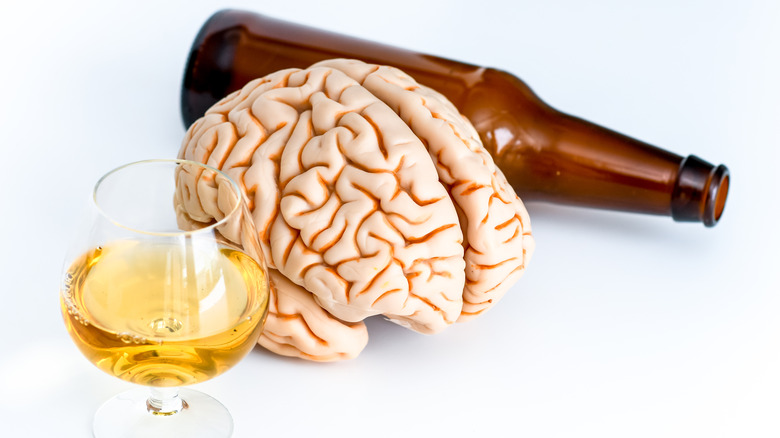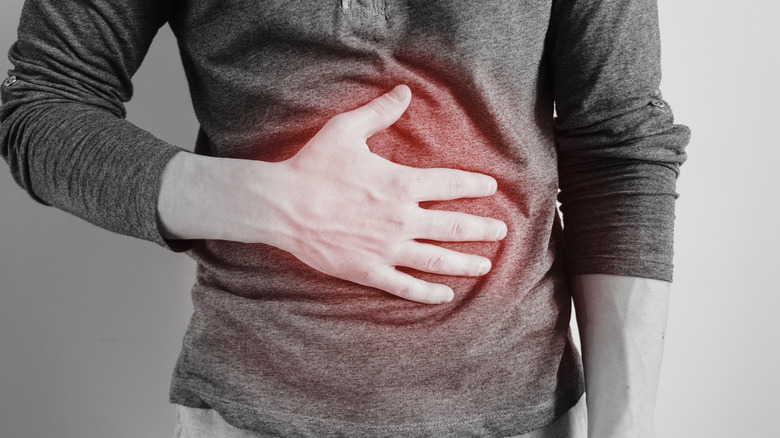What Happens To Your Body When You Have A Hangover
Alcohol has been used to celebrate and commiserate for centuries. There's evidence that even ancient humans enjoyed getting a bit tipsy — references to post-drinking aches and pains can be found in ancient Egyptian and Greek texts as well as appearing in the Old Testament (via Alcohol Health & Research World).
An alcohol hangover — medically termed "veisalgia" — is defined as "mental and physical symptoms, experienced the day after a single episode of heavy drinking", according to a recent consensus published in the journal Addiction. And it's said to begin "within several hours after the cessation of drinking, when a person's blood alcohol concentration (BAC) is falling," per Alcohol Health & Research World.
Up to 68% of people who drink alcohol report experiencing a mild to moderate hangover, based on a study published in Addiction. This manifests differently for everyone: For some, it's hardly noticeable, and for others, symptoms may include a pounding headache, unrelenting tiredness, and nagging nausea. Despite its prevalence, doctors and scientists are still not entirely certain exactly what causes this phenomenon. Here's a peek into what goes on in your body while you're in the throes of a hangover.
Your body is dehydrated
A hangover is commonly chalked up to dehydration. Alcohol is a diuretic, after all, so it makes you urinate more frequently than usual (via Alcohol Health & Research World). Getting intoxicated suppresses the production of vasopressin — a peptide hormone that's released by the pituitary gland — which helps your body conserve the right amount of water by communicating with your kidneys. A shortage of this hormone can result in severe dehydration. This may underlie some of your typical hangover struggles like a throbbing headache, dry mouth, and feeling lethargic and thirsty (via Alcohol and Alcoholism). Other side effects of one-too-many alcoholic beverages may include sweating, vomiting, and diarrhea, all of which can exacerbate fluid loss and electrolyte imbalances (via Alcohol Health & Research World).
However, researchers have shown that dehydration is just one piece of the hangover puzzle — it doesn't fully account for the various effects of overdoing it on booze. A 2010 study published in Current Drug Abuse Reviews challenged the traditional notion that a hangover is solely due to being parched. The study authors failed to identify a strong link between markers of dehydration and being hungover. For example, electrolytes levels — which are naturally occurring compounds that dip when you're dehydrated — were detected as being pretty much the same in people with and without a hangover. This implies that there must be some other factors at play as well.
There's a buildup of toxins in your body
Scientists are yet to pinpoint precisely why people feel so wretched after heavy drinking. But a compelling theory is that your hangover stems from a buildup of toxins in the body, according to Scientific American. When your liver breaks down ethanol (the chemical compound in alcohol), it creates a toxic byproduct and carcinogen called acetaldehyde, details a 2021 study from the journal Nature. Acetaldehyde can damage the cells and tissues of the organs where alcohol is metabolized (via Verywell Mind).
A few studies have drawn a link between elevated acetaldehyde levels and hangover symptoms, such as skin flushing, headaches, muscle pain, and nausea, as explained by a report in the Journal of Clinical Medicine. But according to more recent research, there's no significant correlation between acetaldehyde concentration and the severity of your hangover, and some studies have even found acetaldehyde levels to be low during a hangover. Researchers point out that this is because the brain protects itself from acetaldehyde with its unique blood-brain barrier.
"Because acetaldehyde is a very reactive compound and toxic to the body, your body has an efficient mechanism for handling that. It changes it into a very stable compound, which is acetate," Michael Oshinsky, director of preclinical research at Thomas Jefferson University, told Scientific American. While acetate can cause a pretty brutal headache, "your body is filled with [it] and there are lots of other biological processes that have acetate as a by-product."
Some people are more prone to hangovers
The speed of alcohol metabolism may ultimately determine the specific flavor of misery you experience after a boozy night out, suggests some researchers. A fast breakdown means that ethanol and acetaldehyde are quickly removed from the body. Fast elimination of ethanol, in particular, is associated with a less severe hangover since ethanol, unlike acetaldehyde, crosses the blood-brain barrier and is able to influence the brain and induce hangover symptoms.
Alcohol metabolism is mostly undertaken by the liver and its enzymes — alcohol dehydrogenase (ADH) and aldehyde dehydrogenase (ALDH) — but the pancreas, brain, and gastrointestinal tract also play a role (via Verywell Mind).
Research in the Journal of Clinical Medicine indicates that people process alcohol depending on their genetic makeup. For example, people of Asian descent tend to have a genetic variant of the enzyme ALDH, which means they have a slower breakdown of acetaldehyde into acetate and water. Asian people also report worse hangovers — a common symptom being skin flushing — which may be due to acetaldehyde lingering in the body. Some studies, like one published in Ugeskrift for Læger, show that women usually have worse hangovers than men. And while the research on this remains sparse, scientists speculate that women generally have less of the ADH enzyme that converts alcohol to acetaldehyde, putting the body under strain.
Your body experiences inflammation
Some scientists propose that inflammation may be to blame for the bulk of your hangover anguish. A 2020 study published in the Journal of Clinical Medicine hints that your immune system plays a key role in the development of symptoms. The researchers were able to reduce or eliminate immune reactions and lower the body's inflammatory burden by giving subjects a newly devised treatment of a nonsteroidal anti-inflammatory drug and an antihistamine before they drank an alcoholic beverage.
Consuming a large amount of alcohol has been shown to mess with your immune system and send it into full alert mode, causing a similar reaction as an infection (via Alcohol). This triggers the release of cytokines — proteins that are used by your body to detect and fight off bacteria — which can provoke an inflammatory response and give rise to some familiar hangover symptoms like tiredness, nausea, headache, and muscle pain. Several studies have identified high cytokine levels in the body, both shortly after consuming alcohol and during the hangover phase (via Swinburne Research Bank).
"Many people favor the (unproven) popular belief that dehydration is the main cause of alcohol hangover symptoms," wrote the authors of a study in the journal Alcohol and Alcoholism. They continued, writing, "The idea that alcohol hangover symptoms (i.e. memory impairment) are related to immune system activation is strengthened by a relatively new discovery that the immune system and central nervous system (CNS) operate in close communication with each other."
Your memory is affected
Drinking heavily can have a pretty savage effect on your memory — and these consequences can spill over into the next day, suggests a report in the Journal of Clinical Medicine. Additionally, a study published in the journal Neuropsychopharmacology found that individuals' memory retrieval processes were significantly weakened the morning after a binge-drinking session.
Some researchers attribute the memory impairments that occur during a hangover to a compromised immune system (via Alcohol and Alcoholism). When cytokines are fired into the bloodstream, it provokes an inflammatory response in the body, which can interfere with memory formation. Increased cytokine levels correlate with significant lapses in memory including poor outcomes in various memory tests such as a word learning test, story recall test, and figure recall test, based on the findings of a study from the Archives of General Psychiatry.
Moreover, some studies indicate that alcohol affects the hippocampus, which is a brain structure that's pivotal in learning and memory functioning — it also happens to be the part of your brain where cytokine receptors are densely localized on neurons (via Alcohol and Alcoholism).
Your cognition is impaired
Your memory isn't the only cognitive ability that takes a beating from a binge-drinking session. A hangover can "impinge on fundamental aspects of cognitive functioning," highlights a 2019 study, which may include attention, psychomotor performance, executive function as well as other cognitive domains. These hangover-related impairments are likely to have "clear, real-life ramifications," the study authors point out, affecting your capacity to carry out complex tasks that require thinking and concentration. According to a 2018 systematic review from the journal Addiction, a hangover can compromise sustained attention, which in turn, can put people at risk by sabotaging daily activities like driving a car or operating heavy machinery.
These findings are reinforced by a 2020 study that showed that a hangover can have a detrimental impact on your brain's "core executive functions" which help you navigate everyday behaviors like planning and decision-making. Based on the results, people are less able to retain information when hungover. They tend to have poor short-term memory and struggle to focus on goals and switch attention between tasks. As a result, alcohol-induced hangovers have been shown to contribute to "workplace absenteeism, impaired job performance, reduced productivity, [and] poor academic achievement," details a scientific paper from Current Drug Abuse Reviews.
It can compromise your gut health
Excessive alcohol consumption is said to do a number on your gut health, according to a study in Biomolecules. In particular, it may alter the composition of your gut microbes — a process that scientists refer to as "dysbiosis" — which can bring on those next-day symptoms, such as dizziness, nausea, and brain fog (via Ted Ideas).
A 2014 study in the journal PNAS analyzed the intestinal bacteria composition of people with alcohol dependency and their rates of recovery. Both their overall health and risk of relapse appeared to be tied to their gut flora: Those with gut issues like leaky gut syndrome — often associated with inflammation and conditions like Crohn's disease — had a compromised bacterial population in the intestines and lower recovery rates compared to healthier subjects with more diverse gut microbiota and higher rates of recovery.
Interestingly, the microbial changes observed during a hangover also cause the intestines to leak a bacterial toxin called lipopolysaccharide (LPS) into the bloodstream. A 2014 study of 25 non-heavy drinkers in the journal PLOS One discovered that individuals who reported the most excruciating hangovers also had the highest levels of LPS due to inflammation. "Within their guts the alcohol produced a brief, but large increase in the microbe species that were pro-inflammatory, stimulating the immune system as if it were under attack and contributing to the general sick-feeling so typical of hangovers," Tim Spector, a professor at King's College London, explained in an article for The Guardian.
You may have an upset stomach
Some people may say that a tender tummy is part and parcel of a hangover. Before it even reaches your liver where it is predominantly metabolized, alcohol wreaks havoc on your stomach and intestine lining, causing some of those classic hangover symptoms like nausea and diarrhea (via Ted Ideas). It even creates some inflammation in the pancreas, which can contribute to digestive problems.
Both a heavy episode of drinking and a resulting hangover can directly irritate the gastrointestinal tract (via Alcohol Health & Research World). In fact, beverages with a high alcohol content (more than 15% alcohol volume) are likely to inflame the stomach lining and delay stomach emptying. It can also increase gastric acid secretion while causing damage to the mucous cells that line and protect the stomach wall, according to a study published in Alcohol Health and Research World. "Any or all of these factors can result in the upper abdominal pain, nausea, and vomiting experienced during a hangover," warned the authors of the Alcohol Health & Research World study.
It can negatively impact your sleep
There's nothing more inviting than hitting the hay after a bout of heavy drinking. Yet, it can be challenging to get decent sleep when you're hungover. The sedative effects of alcohol can make you drowsy and send you to into dreamland quickly, according to Scitable, but it also lowers your chances of getting restorative sleep, adding up to tiredness the next day.
According to early research, people who consumed alcohol nodded off faster than those who abstained, but they also found themselves waking up more often and experiencing lighter sleep in the latter half of the night. The results of a 2019 study published in the Journal of Clinical Medicine reiterated these findings, demonstrating that heavy alcohol consumption negatively impacts your ability to sleep by reducing both its quality and efficiency.
Alcohol can influence your actual sleep cycle, causing you to spend more time in deep sleep (slow-wave sleep) and less time in the rapid eye movement phase of sleep, which is where you dream, per a study in Alcohol Health & Research World. This latter stage is also where various important functions occur including "memory consolidation," per a report in Neuron. By interfering with your circadian rhythms, booze triggers jet lag-like symptoms such as exhaustion and a higher temperature the next day (via Alcohol Health & Research World).
Your blood sugar levels drop
One of the most commonly reported symptoms of a hangover is fatigue, per a survey published in Alcohol and Alcoholism. One explanation for this is that drinking alcohol initially drives up your blood sugar and then causes it to plummet during the hangover phase, notes The Recovery Village. When alcohol is processed in the body it creates fatty liver and lactic acid — both of which inhibit the production of more sugar from the liver, causing glucose levels to drop and contributing to a listless and lethargic mood (via Alcohol Health & Research World). As a result, you may find yourself reaching out for foods that are high in carbs to make yourself feel better. This spike and crash can be especially dangerous for diabetics as it can give rise to hypoglycemia.
A study published in the journal Diabetes Care revealed that even moderate consumption of alcohol poses a risk for those with type 1 diabetes, predisposing them to hypoglycemia. The researchers found that when people consumed alcohol two or three hours after their evening meal, their chances of experiencing hypoglycemia the following morning shot up significantly. "Ethanol is known to affect various aspects of glucose metabolism, raising several possible explanations for our findings," explained the study authors. There was a reduction in the nighttime secretion of growth hormone, which plays an important role in bone development and protein synthesis and can inhibit glucose production in diabetics (via Alcohol Health & Research World).
You may get a headache
Hangovers and headaches often go hand in hand, according to a survey from the journal Alcohol and Alcoholism, with 87% of people reporting this to be one of their most common symptoms. Similarly, a study published in Neurology revealed that the lifetime prevalence of hangover headaches was 72%.
It is theorized that drinking alcohol leads to vasodilatation, which is when your blood vessels dilate and your blood pressure drops. This may be the culprit behind your headaches during a hangover, explained Healthline. The next day your blood vessels begin to constrict again — a process called vasoconstriction — which can make your headache even worse (via USF Health). Alcohol has also been found to interact with certain neurotransmitters and hormones — such as histamine, serotonin, and prostaglandins — that are associated with headaches, though the specific mechanisms behind a hangover headache need further research, according to a report published in Alcohol Health & Research World.
Some people experience anxiety
Feeling a bit off the day after knocking back some booze isn't unusual. But some people experience anxiety — sometimes referred to as "hangxiety" — in the aftermath of heavy drinking, explained a study in Personality & Individual Differences. One 2014 study found that having an alcoholic drink can evoke a sense of relaxation by triggering and blocking the activities of various neurotransmitters in the brain. In particular, alcohol acts on the GABA-releasing neuron, stimulating the production of GABA, which is the brain's major inhibitory neurotransmitter, while also inhibiting glutamate activity, which is the brain's major excitatory neurotransmitter. These changes can bring about a sedative-like effect, slowing down your central nervous system and neural activity but it can also make you feel anxious and panicky once the alcohol begins to wear off and your brain tries to correct itself and bring your neurotransmitter levels back to normal.
Anxiety is pinpointed as a common thread in why some people develop a dependency on alcohol and some alcoholics relapse, per the 2014 study in Indian Journal of Human Genetics. Not everyone feels anxious after drinking, of course. The 2019 study published in Personality & Individual Differences looked at different degrees of "shyness" among people who drank socially, discovering that next-day "hangxiety" was far more common in those who were naturally shy.
It can even trigger depression
Depression is another mood fluctuation that some people experience with a hangover. About 19% of individuals reported experiencing depression after indulging in alcohol while nearly 2% mentioned having suicidal thoughts, per a survey published in the journal Alcohol and Alcoholism. The type of emotions that heavy drinking can stir up will vary from person to person — a foray into depression certainly isn't universal — but it's not uncommon for people to feel lousy and vulnerable the next day.
A bit like with anxiety, your next-day blues may be explained by the sudden neurotransmitter upheaval that alcohol provokes, explained a study in the Indian Journal of Human Genetics. In particular, alcohol is a depressant that interferes with the release of serotonin and dopamine — your brain's feel-good neurotransmitters. When you drink, your brain might experience an initial perk, but these hormones will come crashing back down the following morning, potentially causing you to feel depleted and depressed. It's speculated that an excess of alcohol in the long term can bring about physiological changes in the brain like tolerance and dependency, resulting in a serotonin and dopamine deficiency which may underlie depression.
If you or anyone you know is having suicidal thoughts, please call the National Suicide Prevention Lifeline at 1-800-273-TALK (8255).
Alcohol allergy and intolerance
Not everyone responds to alcohol in the same way. For some people, a hangover can feel like an unimaginable punishment — not just because they're hungover, but because they're suffering the consequences of an allergy to alcohol. "A true allergy occurs when a person's immune system reacts inappropriately to [alcohol]," Holly Shaw, nurse advisor at Allergy UK, told Cosmopolitan, explaining that this is usually rooted in a "sensitivity to sulphites and histamine."
A study published in Addiction Biology reported that some alcoholic beverages spark allergic reactions such as itching, facial swelling, coughing, and asthma. Wine tends to be particularly triggering as it contains certain components that people are intolerant to like biogenic amines and sulphite additives. Some people are also more sensitive to congeners, noted researchers, which are chemicals that are produced in fermentation. They tend to be more abundant in darker-colored drinks, which may explain the interesting finding that bourbon and whiskey generally elicit worse hangovers than clear or light-colored drinks like vodka. It turns out that not all drinks are equal when it comes to the perils of a hangover.
Although true allergies to alcohol certainly exist, alcohol intolerance is more common, according to the Cleveland Clinic. Symptoms include skin flushing, vomiting, stuffy nose, heart palpitations as well as some hangover-like symptoms.















